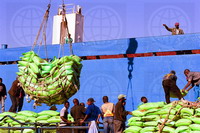US makes Peru partner in free trade agreement
U.S. is going to make Peru the first country to join the United States in a free trade agreement since Democrats took over the U.S. Congress in January.

Senate Finance Committee Chairman Max Baucus, a Democrat, praised the U.S.-Peru Trade Promotion Agreement at a hearing of his committee as the first ever to include "meaningful, and fully enforceable, labor and environmental standards."
Farming and manufacturing representatives also praised the agreement, and the chief international economist of the AFL-CIO, the United States' largest labor federation, said it was an improvement over past trade agreements. The unions did not endorse the deal, however.
A majority of Democrats and their crucial labor and environmental group allies have long been wary of free trade deals, saying they lead to the flight of U.S. jobs abroad, exploitation of foreign workers and degradation of foreign environments.
But the equation changed last May when Democrats in the U.S. House of Representatives, led by Ways and Means Committee Chairman Charles Rangel, negotiated a deal with the Republican Bush administration that guaranteed labor rights and the environment would be core elements of future trade accords.
Baucus said that as a result, Peruvian workers would be assured the right to organize and bargain collectively, and Peruvian children would stay in school rather than work in sweatshops.
Thea Mei Lee, an AFL-CIO economist, said that while the agreement does not address all its worker rights' concerns, it was "an enormous improvement" over past Bush administration agreements with Chile, Singapore, Morocco and others.
She said AFL-CIO unions were on both sides on the Peru agreement, and it was putting its priorities into opposing two other pending free trade agreements, with Colombia and South Korea.
Senate Democratic leaders have indicated that the Peru agreement could reach the Senate floor by mid to late October. Another agreement with Panama could be dealt with this year as well, while the Colombia and South Korea deals are more problematic - Colombia because of human rights worries and South Korea because of its restrictions on U.S. auto and other imports.
The United States currently buys about $5.9 billion (4.3 billion EUR) worth of Peruvian products a year, and sells about $2.9 billion (2.1 billion EUR) worth in Peru. With implementation of the agreement, about 80 percent of U.S. consumer and industrial products and two-thirds of farm exports would enter Peru immediately without imposition of duties.
Sen. Charles Grassley, top Republican on the Finance Committee, cited estimates that the agreement would result in a 25 percent boost in U.S. exports and 8 percent growth in Peruvian exports.
David Winkles, member of the American Farm Bureau Federation trade advisory committee, told the panel that U.S. agriculture exports to Peru, currently around $223 million (161 million EUR) a year, could jump by more than $700 million (506.4 million EUR).
But Lori Wallach, director of Public Citizen's Global Trade Watch, said in an interview that it also would "displace millions of peasant farmers in Peru." She said many labor and environmental groups with ties to Democrats are "basically infuriated that Democrats are going to consider passing more Bush NAFTA deals," referring to the 13-year-old North American Free Trade Agreement with Mexico and Canada. "They are putting a new roof on a condemned building."
Several at the hearing, including Lee and former Clinton administration trade chief Mickey Kantor, stressed that Americans will support free trade where clear evidence exists that the administration is enforcing promised labor and environmental standards.
"What we have right now are the right words on paper," said Democratic Sen. Debbie Stabenow. "That's not enough."
Subscribe to Pravda.Ru Telegram channel, Facebook, RSS!





